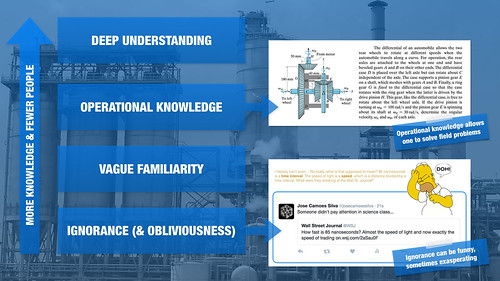Suppose someone says "I love French [the language]." You'd probably assume they spoke French. If someone says "I love skiing," you'd probably assume they can ski; if someone says they "love science," well, that's a bit more complicated.
In fact, if people "loved French" like they "love science," most of them wouldn't be able to translate "Oui."
And that's a problem on three different levels:
1. At the most basic level, pretending to like science but with no interest in learning any (which is what "I love science" people do) creates a disconnect between words and reality. That disconnect has been thoroughly exploited by publicity-seeking celebrities, opportunistic politicians, and greedy stem-o-preneurs to advance their own agendas.
2. Past this basic 'branding/image-driven' level, we find that those who benefit from a distortion of the meaning of science (STEM, really) and those who are afraid their pretense will be exposed actually act against the advancement of science (STEM, really), using arguments more suited to politics ("x percent of scientists believe that..." as if science was a matter of votes) or authoritarian autocracies.
3. But at a very deep level, this "I love science" pretense corrupts the very idea of actually knowing or understanding something, which is essential to the development (and maintenance) of our technological-dependent society.
A previous blog post has touched on this idea, but we'll elaborate on it here, with some implications.
The figure at the top describes four levels of knowledge, roughly separated by their real-world implications; a big problem with the "I love science" crowd is that they act as if the differences between these levels have no real world implications, which they do. From top to bottom:
Ignorance, particularly when combined with obliviousness, can be funny but can also be exasperating. I make some hay from media ignorance in a number of posts (one, two, three), and YouTubers Thunderf00t and EEVblog have fun debunking nonsense that's based on exploiting this ignorance.
But ignorance of science persists, and persists in people who "love science," mostly because their interlocutors are not willing to ask questions. Imagine that someone said they love French; we could then say "tu parles Français, alors?" The people who love French like they "love science" will hear gibberish. This would be an immediate "poseur" alarm; but most people who would do it for French won't ask these questions for science.
(One may even be called anti-social for asking sciencey things to someone who "loves science.")
A passing familiarity with the topic can be a dangerous social trap. As the joke goes, these are the people who believe they can argue successfully with an expert based on having heard a TED talk on the subject while cycling at the gym. It's particularly dangerous when this passing familiarity is acquired by reading popularization tomes created by popularizers (instead of people working in the field).
The problem with passing familiarity is that most people tend to overestimate the reach of their familiarity, mistaking the recognition of sentences for actual understanding of those sentences. In our continuing French example, this would be the case of someone who had some French lessons decades ago and watches French movies with subtitles but can't do much more than ask people in France if they speak English.
In STEM this is a complicated level, since there are people who have a reasonable qualitative understanding of the issues without being able to actually solve technical problems (of any complexity), while there are others who follow the Mythbusters' "science as big booms" or focus on the scientists rather than the science.
There's a second-order effect in this problem, which comes from the importance of quantitative thinking in STEM. Many people have some sort of numerophobia: they resist numerical thinking for whatever reason. Perhaps insecurity, perhaps bad experiences with the educational system. But for STEM, once we're past the basics, numbers matter. Numbers become all that matters.
(There's an interesting case of this familiarity-level overreach in Business Management [as a discipline]: many people who have a vague familiarity with business speak think that they actually know business material. Some of them say things as ignorant as "management is just common sense," at which point I ask them to value an option or process some market research data using common sense.)
Operational knowledge is the level at which most people who actually know something operate. For our French example, that would be a person who can communicate like a French person (talk with French people, watch French-language movies and TV shows, write blog posts in French, read French books).
I have in the past suggested screening social interactions using simple questions, sometimes as simple as asking for basic unit conversion (how many Joule in a kilowatt-hour?) sometimes with a problem or two:
In STEM these tend to be the Research and Development departments, the research scientists, the design engineers, the specialized technical consultants. In other words, the people who create the future of our technological society.
(At this point one feels obliged to note that people with a deep understanding of STEM tend to be the most reviled in most social environment: cf. definitions for nerd and geek.)
What is both ironic and dangerous is that (as indicated in the chart at the top) the number of people in each level of knowledge decreases with increasing knowledge, but (not indicated in the chart) the level of confidence these same people have in their statements about STEM doesn't. I believe that this is a definite change relative to a few decades ago, and not a change for the better.
It appears that the cost of increasing the popularity of "loving science" was the loss of meaning of "knowing science" (STEM, really). This is a dangerous trend in a technology-dependent society.


